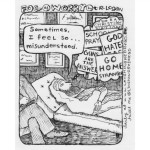We run our website the way we wished the whole internet worked: we provide high quality original content with no ads. We are funded solely by your direct support. Please consider supporting this project.

Conflicting Pictures of God
In my ongoing reflections on the ReKnew Manifesto, I’ve spent the last two posts (here and here) arguing that nothing is more important in our life than our mental images of God. If so, then the all-important question is: what authority do we trust to tell us what God is like? To most evangelicals, the answer is obvious: “the Bible.” If the Bible is the one and only inspired Word of God, what other answer could one possibly give?
I fully agree that the Bible is the inspired Word of God, but I think we have to be careful saying we should base our mental picture of God on this. For this would suggest that all of its various portraits of God have equal authority to tell us what God is like. In this case, for example, the portrait of God telling his people to “destroy [the Canaanites] totally” and to “show them no mercy” (Deut 7:2) as well as the multitude of pictures of God engaging in horrific violence would have the same authority to reveal God to us as the portrait of God revealed in Christ. Every violent portrayal of God in the Old Testament would be on a par of the portrait of God giving his life for his enemies and praying for their forgiveness with his last breath that we find in the crucified Christ. In other words, Christ would comprise only part of our mental image of God, but not the whole image.
In this light, it’s not surprising that so many Christians have conflicted images of God. Luther and Calvin, for example, celebrated the beautiful love and mercy of the God revealed in Christ, but they also both spoke of a dark side to God that is hidden behind the cross. Though he’s revealed in Christ to be full of love, both of these theologians envisioned another side of God which predestines all the evil that comes to pass and even decrees that the majority of humans spend eternity in hell. In his Institutes of the Christian Religion, Calvin himself called the decree of damnation “a horrible decree.”
It’s been my experience that, by virtue of giving all portraits of God equal authority to define our image of God, most Christians have, to one degree or another, a composite image of God in which Christ represents the “loving side” of God while the Father represents a side that is capable of engaging in behaviors that seem the opposite of loving – like predestining Auschwitz and the damnation of untold numbers of people. And with such amalgamated mental pictures of God, it’s not surprising that so many find it hard to passionately love God or get all their LIFE from God.
I agree that the Bible is the inspired Word of God, but as we’ll begin to see in my next post, the Bible itself teaches us that we are not to give every portrait of God equal weight. We’ll see that God has, throughout history, condescended to whatever level he needed to in order to relate to people where they were. And this meant that God often had to take on appearances that conceal more of his true character than they reveal it. Only in Christ do we find the truth of what God is really like.
Image by Derrick Tyson. Used in accordance with Creative Commons. Sourced via Flickr.
Category: General
Tags: Bible, Jesus, Picture of God, ReKnew
Related Reading

How to Interpret the Law of the Old Testament
While there are multitudes of passages in the OT that reflect an awareness that people are too sinful to be rightly related to God on the basis of the law, there is a strand that runs throughout the OT that depicts Yahweh as “law-oriented.” This label is warranted, I believe, in light of the fact…

Finding an Alternative Jesus
The “Newly Discovered” Jesus One of the most common, and most disturbing, refrains heard in the media’s coverage of contemporary radical views of Christ is that New Testament scholars have recently “discovered” new sources of information about Jesus that contradict the Bible’s own view of Jesus. It is claimed that works such as the Gospel…

The Starting Point for “Knowing God”
While it makes sense that Hellenistic philosophers embraced knowledge of God as the simple, necessary and immutable One in an attempt to explain the ever-changing, composite, contingent world (see post here for what this means), it is misguided for Christian theology to do so. By defining knowledge of God’s essence over-and-against creation, we are defining God’s essence…

5 Differences Between The Kingdom of God and the Kingdom of the World
Image by matthijs rouw via Flickr The kingdom of God looks and acts like Jesus Christ, like Calvary, like God’s eternal, triune love. It consists of people graciously embracing others and sacrificing themselves in service to others. It consists of people trusting and employing “power under” rather than “power over,” even when they, like Jesus, suffer because…

Why Did It Take SO Long for God to Reveal Himself in Jesus?
Greg talks about why it took God so long to reveal himself in Jesus. http://traffic.libsyn.com/askgregboyd/Episode_0048b.mp3

